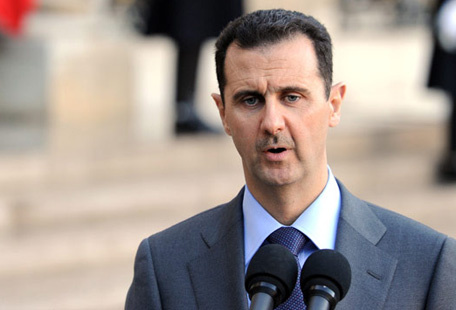Russian Cold War, Syrian “Hot” War

The capital has witnessed scenes of conflict during the last two months. These unrests first took place first in townships in the vicinity of the capital. However, tensions spread to townships close to Damascus and its suburbs and, in the last two to three weeks, the focus of conflicts has been, more than other places, on Damascus. The explosion in the National Security Center of Damascus, which has resulted in the death of four high-ranking military and security commanders and the injury of many others, has been the most serious crisis Syria has faced since March 2011, which shows that the situation is getting out of Bashar Assad's control.
On the other side of Syria's developments and in the international scene, we are faced with a limited cold war with regard to the crisis in Syria. The US and its allies, which comprise of 110 countries who have held conferences under the title “Friends of Syria” during the past few weeks in Paris, Cairo, and Ankara, demand the resignation of Bashar Assad. On the other hand, Russia and China and several other countries support Bashar Assad. This difference of opinion manifests itself in the UN Security Council, where Russia and China have vetoed Security Council resolutions regarding Syria three times so far.
This gap and difference within the international community has given an opportunity to the government of Syria to use laws similar to those enforced during cold war periods. Syrian officials believe that, if they can end the clashes through widespread suppression and within a time frame as they did in 1982, they will be able to maintain their power and save themselves. But, considering the new mechanism of world order, taking such measures would never be accepted nor would they be operational. Now, if we accept that a limited cold war exists, we will see that both sides of the confrontation in Syria are making all their efforts, despite international developments, to gain more advantages on the ground. It seems that both sides, meaning the government of Syria and armed opposition forces, have reached the assessment that they must strengthen their situation in regions that are under their control.
During the past few weeks, and despite all the efforts they have made, the US and Russia have been unsuccessful in reaching an agreement regarding Syria which would align the international society. They have only been able to agree to extend the stay of UN observers in Syria for another thirty days. The message hidden behind this failure is the failure of the Kofi Annan plan. This situation has created a type of hopelessness with regard to international developments, especially among the opposition, causing them to rely less on international forces and to make efforts to strengthen their positions by themselves, using the facilities at hand. Therefore, bearing in mind the deadlock reached at the Security Council and the inability of the international society to reach an agreement in order to solve the Syrian crisis, we can expect both sides of the Syrian conflict to use all their power to gain better positions and hurt the other side as much as possible. It seems that the cold war that is observed in the international arena has led to a “hot” war in Syria.

